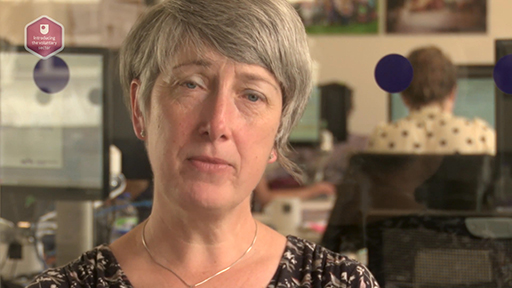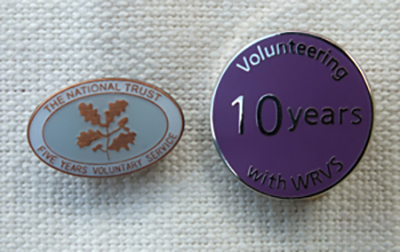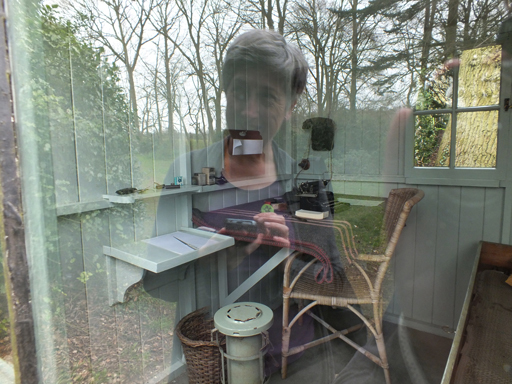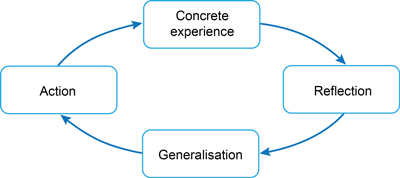Week 8: Next steps for working and learning in the voluntary sector
Use 'Print preview' to check the number of pages and printer settings.
Print functionality varies between browsers.
Printable page generated Sunday, 5 May 2024, 6:14 AM
Week 8: Next steps for working and learning in the voluntary sector
Introduction
Congratulations on reaching the final week of the course! Hopefully you will have developed an understanding of the voluntary sector and gained useful insight into how your own experience fits with the issues covered.
This week you will have an opportunity to consolidate your learning and think about your next steps in working or volunteering in, or other engagement with, voluntary organisations. You will reflect on what you have learned and think about what your next steps might be in terms of working, volunteering and learning. You will also find out about how to learn from experience and, in particular, how a ‘learning cycle’ can be applied to your work or volunteering experience.
In the following video, Julie introduces you to Week 8.

Transcript
By the end of this week, you should be able to:
- reflect on what you have learned on the course
- make plans for what you would like to do next in terms of further learning, work or volunteering
- understand the benefits of volunteering
- identify ways of finding a job or volunteering experience
- understand the learning cycle approach and apply it.
1 Reviewing your learning

It might have been one of several reasons why you chose to study this course – perhaps you’ve been thinking about volunteering or working in the voluntary sector and wanted to find out more about it; or you already work or volunteer and are seeking to build on your existing knowledge or skills. You may of course just have a general interest in voluntary organisations or are looking to develop your study skills for further learning.
Whatever your reasons for doing the course, it is useful to review what you have learned, which will then help you decide on your next steps. These steps might be applying for a job or volunteering role, looking for a new course to study or considering how to enhance your promotion prospects at work. Or you might simply want to make more of your current job or volunteer role.
Throughout the course, you have had a lot of practice in applying the key course ideas to your own experience. This has two purposes:
- It helps you to develop your understanding of the course ideas.
- It provides you with the opportunity to reflect on what you have learned and what you know about your own experience.
Reflection is an integral part of learning (whether this is through formal study or in the workplace) from both good and bad experiences. You will look at reflecting on learning in the workplace in Section 5.
You may already have questions you want to think about further or made a note of topics that particularly interested you while doing the course. If you haven’t, then there is the opportunity this week to go back over the topics and activities to remind yourself of what you found particularly interesting or relevant to your situation. There may even have been some topics you found challenging that you want to revisit.
1.1 Review and reflection
It is useful to give yourself space to review what you have done on the course, and to revisit any aspects that you need to complete or about which you want to think more deeply. The following activities give you the chance to do so.
Activity 1 Reviewing the course topics and activities
Table 1 is provided to remind you of the topics you have covered in each week. Identify those you feel confident about and those you would like to learn more about. You might want to revisit the activities associated with each topic to remind yourself of whether you were able to apply it to an example of your own.
If you wish, you can download the table and fill it in.
| Week | Key topics | I am confident about these | I would like to learn more about these |
|---|---|---|---|
| 1 | 1 What is voluntary about the voluntary sector? | ||
| 2 | |||
| 3 | 1 Data about the voluntary sector 2 Size of the voluntary sector 3 Contribution of the voluntary sector to the economy | ||
| 4 | |||
| 5 | |||
| 6 | |||
| 7 |
Comment
Completing this table will have given you a sense of what you have achieved so far. You might have noted some topics that particularly interested you and that you might want to study further or discuss with colleagues (if you are working). Next, you’ll develop these thoughts further and formulate your thoughts into action points.
Activity 2 Identifying areas for further study
Now identify three areas that you would particularly like to learn more about through further study or through where you work or volunteer.
Try to make your ideas quite specific about what you want to do. So, instead of writing ‘look again at annual reports’, for example, write something like ‘practise interpreting annual reports’ or ‘revisit my organisation’s annual report to see if I can make suggestions on making it clearer for stakeholders’.
Also, note whether you think this could be something you can do now and practise further through your organisation and/or whether you want to take another course.
Table 2 has been partially filled in to show the kind of information you need to capture. You can either copy the table and fill it in or, if you prefer, use the word document we have provided.
| Priority area | Why? | What do I want to do? | Work or further course |
|---|---|---|---|
| Practise interpreting annual reports | To make sure I understand the information they contain | Progress to a management role | |
| |||
|
Alternatively, you could fill in the boxes below.
Comment
When you know your priorities, you will be in a good position to decide what your next steps will be in terms of your job, volunteering or further learning.
2 Your next steps

Having reviewed what you’ve learned about the voluntary sector and identified areas you’d like to learn more about, now is the time to clarify your thoughts before deciding on your next steps. If you did this course just for personal interest, you may not have any ‘next steps’ – you may be happy with your current situation and not wish to do any further learning or make any changes. If, however, you would like to do further work, volunteering or learning about the voluntary sector then the next activity will help you work through some decisions.
Activity 3 Clarifying your thoughts
Read through the list of questions below and make some notes. The questions are divided into topics related to learning, working and volunteering. They are designed to prompt your thinking but do not feel constrained by them.
There is quite a lot to think about here, so you might want to write detailed notes and reflect on them before moving on to the next stage in your decision making.
Learning
- Did you enjoy learning online? What were the best aspects and what did you find challenging?
- Did you enjoy learning about the voluntary sector?
- Which topics did you want to learn more about (revisit Activity 1 if necessary)?
- Were there topics you wanted to know more about that were not covered by this course? What were they?
- Do you want to do another course? If so, which subject area?
Working
- If you are already working, do you want to stay in your current role?
- If you are already working, what do you like best and what do you like least about your role?
- If you want to stay in your current role, what would improve it?
- What do you need to do in order to get a promotion (if that is what you are looking for)?
- Do you want a new or different job? If so, what?
- What skills or knowledge do you need to acquire?
Volunteering
- If you are already volunteering, do you want to stay in your current role?
- If you are already volunteering, what do you like best and what do you like least about your role?
- If you want to stay in your current volunteering role, what would improve it?
- Do you want a new or different volunteering role? If so, what?
- What skills or knowledge do you need to acquire?
Comment
Reflecting on these questions should have helped you clarify what you want to change or how you want to progress. Alternatively, you might find that you now realise that you are happy with your current situation and do not wish to do any further learning or make any changes.
However, if you would like to do further work, volunteering or learning about the voluntary sector then the next activity will help you make some decisions.
Activity 4 Making a decision about your next steps
Read through your notes again and express them as statements of action, such as:
‘I would like to apply for a volunteering role.’
or
‘I want to get paid work in the voluntary sector.’
Comment
You might have a lot of ideas about what to do next – which might seem stressful! Just think about one at a time. Also be realistic about what time you have available to plan and implement any changes – there is no need to rush in. Your plans will probably be a mix of short-term and long-term goals. You may also need to do further research if you are interested in more study or looking for a new job or volunteering role. The next sections will help you with planning some of these steps.
Having reviewed what you have done over the past few weeks, and taken a bit of time to clarify your ideas, you are now in a good position to think about how to achieve what you want to do next.
In the next section, you will look at how to get your first, or a different, volunteering role. Even if you are certain you do not wish to volunteer or change an existing role, you will still find this section useful.
3 Do you want to volunteer?

Badges awarded for long service. The badge on the left says: The National Trust, Five years voluntary service. The badge on the right says: Volunteering, 10 years with WRVS (Women’s Royal Voluntary Service).
In Week 7 you explored the various reasons why people choose to volunteer. For many, volunteering has an altruistic element but they also need to derive satisfaction and interest from the role, otherwise they will not continue to volunteer no matter how committed they are to the organisation or to the people involved. If you do not enjoy something or see it as worthwhile, why would you turn up again and again?
Volunteering can also offer other benefits. For example, volunteering is believed to be good for your mental and physical health – giving people the opportunity to make new friends, keep busy and feel appreciated. Some roles are physically active, such as gardening. Some volunteer roles are short term, such as for one-off events or while between jobs or other commitments. Other roles are long term – although many people probably do not think about the length of time they intend to spend volunteering.
The next activity illustrates the benefits or positive outcomes of volunteering for both individuals and society.
Activity 5 Benefits of volunteering
Read this blog entry about the positive features of volunteering and note down those that appeal to you, whether you are considering volunteering for the first time or currently volunteering.
10 things I learnt during Volunteers’ Week
Posted on June 8, 2015 by Justin Davis Smith
As another hugely successful Volunteers’ Week draws to a close I thought I would look back and reflect on 10 new things about volunteering I learnt over the past seven days.
Over a third of us would be interested in volunteering for the NHS
A new survey by ICM for RVS has found that 40% of adults would be interested in volunteering for the health service, with the most popular activities being helping out in a shop or café, taking patients out on social visits, hospital visiting, or assisting on the ward.
Volunteers play an important role in strengthening democracy
A new report from CDF, Trust in Democracy: how community groups bridge the gap between people and politics, reveals that volunteers are almost 50% more likely to feel they have an influence over local political structures. And many people involved in community activity use it as a grounding to go into more formal political roles.
Volunteering will impress future employers
According to a study from the employment consultants Universum employers are less impressed by your qualifications and which university you went to and more taken with the skills and experience you have learnt through volunteering and work experience.
Volunteering is one of five lifestyle choices guaranteed to make us happier
According to Professor Paul Dolan who was speaking at this Year’s Hay festival. The others are listening to a favourite piece of music, spending five minutes with someone you like, going outdoors, and having a new experience. It got me thinking that someone volunteering at Glastonbury for the first time with a friend might be able to clock up all five at the same time? Prof Dolan leaves us with the following natty sound-bite: ‘helping other people is a very selfish thing to do. It’s a good source of happiness for you. Just randomly help someone and see the difference’.
Young people who take part in volunteer projects are more willing to participate in volunteering again….
…. but less likely to donate to charity, according to a new study published by the Cabinet Office.
We are getting better at recognising the contribution of volunteers
There were 187 recipients of the Queens Award for Voluntary Service this year, up 60% on last year, recognising the contribution volunteers make in all walks of life, from helping us remember Britain’s worst mining disaster to a volunteer rescue boat service on Loch Lomond.
Employer-supported volunteering is on the rise
According to latest figures from the Community Life Survey featured in this year’s Civil Society Almanac published by NCVO today. However, although volunteering remains strong, with 27% of adults in 2013/14 (the latest year for which figures are available) having taken part at least once a month through an organisation and 41% at least once a year, participation has dipped slightly from the previous year’s figures of 29% and 44% respectively.
The new influx of MPs seem to have got the volunteering bug
61 Members signed up to an Early Day Motion welcoming Volunteers’ Week and celebrating the value of volunteering and ‘the promotion of civic democracy based on the principles of freedom of expression and association’ which ‘supports and enhances life in the communities of the UK’. As of Sunday 7 June this was the best supported EDM this Session. Oh and worth noting that 41 of the 61 signatories came from the Scottish National Party, so further work to do with our parliamentarians in the rest of the UK.
More than a billion people volunteer globally
So says the latest State of the World’s Volunteerism Report, published by the United Nations. The report praises some governments such as Peru, Mozambique and Norway for developing a ‘supportive environment’ for volunteering, but criticises others for failing to acknowledge ‘the immense potential of volunteers to help them chart a more successful development path’.
And finally
Volunteering is more popular than ‘Britain’s Got Talent’
Well on Monday Volunteers’ Week was trending number two on Twitter, ahead of Britain’s Got Talent Final 2015, making the point perhaps that volunteering is the greatest demonstration of the UK’s talent. At one stage during the Week we were trending at number one in London and Birmingham, number two in the UK and an incredible number eight in the world!
Thanks to everyone for your contribution to the Week and the biggest thanks of course to the brilliant volunteers.
Comment
The idea of feeling happy due to volunteering is certainly appealing. For many, the possibility that it will help in getting paid work is also positive. Many people will continue to volunteer even if they have paid work and, as the article highlights, employer-supported volunteering is on the rise.
3.1 Volunteering and employers
Employers are reported to be impressed by voluntary work. Research carried out by Reed Recruitment agency for the charity Timebank (OU Careers, n.d.) found that:
- 73 % of employers would employ a candidate with volunteering experience over one without
- 94 % of employers believe that volunteering can add to skills
- 58 % of employers say that voluntary work experience can actually be more valuable than experience gained in paid employment
- 94 % of employees who volunteered to learn new skills had benefited either by getting their first job, improving their salary, or being promoted.
There is clearly little doubt about how employers see the benefits of volunteering experience. Although all volunteering can be interesting to them, there are some careers where relevant volunteering experience is a prerequisite. Teaching, law, environment/conservation, heritage and social work are common examples but there are many others. Positions in the arts, media, publishing, development and charitable sectors are often difficult to enter without a network of contacts, direct practical experience of the industry and enormous enthusiasm.
Internships – which are lengthy periods of unpaid work – are important in many industries. However, they have attracted criticism in the media and from candidates seeking work as not everybody can afford to take them on. Furthermore, it is argued that they should be offered as unpaid work experience, for example doing a one-off project or shadowing staff, and with training, rather than being essential jobs that were once paid positions. In other words, some industries are using internships appropriately whereas other organisations are perceived as exploiting volunteers.
3.2 Looking for a role
Many people are unaware of just how much they could offer the community or a good cause, and underestimate their strengths and experience.
You need to assess your skills, experience and interests, and then balance all of this against your practical circumstances and any possible constraints.
You might like to try accessing websites such as Do-it or the websites of any of the major charities. They describe the personal qualities needed for their vacancies, e.g. being non-judgemental, patient, flexible. These sites will also say if there are any specific skills required for a post, such as IT, driving, etc. and give an idea about practical considerations, like time commitment.
Activity 6 Where to find volunteering opportunities
Use the websites below to help you match your interests, experience and personal circumstances to actual vacancies. Insert your personal specifications into any of the following websites using their drop-down menus. You do not need to visit every website – just pick one or two to explore.
You can insert preferred geographical area and availability, and from drop-down menus select your type of interest and the kind of activity you would like to do, e.g. befriending, buddying, driving, legal work, artistic, etc.
These sites list the main categories of voluntary work, such as animal welfare, arts and heritage, community development and campaigning, and health and social care (including sections relating to young people, elderly, disabled, etc.). There are also subcategories, e.g. for campaign volunteering. These include discrimination, human and civil rights, environment and conservation, and political parties. The Volunteering England site also contains volunteer blogs.
- Charities
Websites of many charities also have drop-down lists of skills or interests, commitment level, location and preferred role type, e.g. Sue Ryder Care and the RSPCA (Royal Society for the Prevention of Cruelty to Animals). Other charities such as Volunteering Matters provide a range of activities to select from, for example supporting an at-risk family or helping at a local school.
Most charity websites are very informative and user friendly. They also widen your horizons about what type of work you can do. Many people never think beyond the fundraising aspect but at the RSPCA, for example, volunteers can walk dogs at the local shelter, home-visit prospective adopters or do home-based computer work (updating the website or databases, etc.).
- Other organisations
Rotary International in Great Britain and Ireland (RIBI or Rotary) provides many opportunities to volunteer both locally and internationally. The members and volunteers plan and tailor projects to specific communities. Rotary has 1800 clubs across the UK and 50,000 members and volunteers.
- Volunteer centres
You can visit your local volunteer centre to talk about what you might like to do: the centre will know all the opportunities in your area.
Comment
Hopefully you have found something you might want to apply for or perhaps looking at the opportunities has helped you work out what might interest you. Opportunities come up all the time, so even if there was not much of interest or in your location you will know which websites to return to at a later date.
3.3 Making the most of your volunteering
If you already volunteer, you may wish to include your volunteering experience as part of your CV – and many job application forms do specify to do this. The next activity gives you some suggestions on how to think about this. Even if you are not planning a job application, it is still useful to do this activity as it gives you a chance to reflect on any experience you have. If you want to learn more about creating a CV, you might want to take a look at another badged free course on OpenLearn, Succeed in the workplace.
Activity 7 Putting volunteering on your CV
Make notes on the following (you could also incorporate the first three aspects into a practice CV):
- What did you do while volunteering and what have you achieved?
- What did you learn and what skills did you develop?
- What training or induction did you receive?
- How do you want to improve from here?
Comment
It is often not till you try to incorporate volunteering into your CV that you realise how many different skills you have learned or what valuable experience you have gained. Things like working in a team, working with customers, clients or visitors, organising an event, using social media to promote an organisation, writing a newsletter, mentoring new volunteers, chairing a meeting, and so on are all important skills and experiences. Not all volunteers receive formal training or an induction, although this is likely to be important (and relevant to a CV) in health and social care volunteer roles, especially if you work directly with service users.
You may know that you would like to be paid to work in the voluntary sector but are unsure what you would like to do. To begin by volunteering will give you the opportunity to explore different roles and to find out about different organisations. You may not get a sense of what the more specialist or senior roles are like but you would get to meet different staff members and talk to them about their jobs. Also, it is useful to know what it is like to be a volunteer and be managed by paid staff. Then, if later on you are in a position of managing or supervising volunteers, you will have experience of the ‘front line’.
4 Finding paid work in the voluntary sector

As you might imagine, there are many different places in which to look for a paid job in the voluntary sector. Most big charities advertise paid jobs nationally, for example in The Guardian online. There are also dedicated websites for those seeking charity jobs – try looking on Charity Job or Third Sector Jobs. These websites often have careers advice sections too.
As with volunteering opportunities, many local councils for voluntary action or service also advertise voluntary sector jobs, usually for small local organisations. Furthermore, there are many websites advertising specific roles, such as fundraising, that cut across sectors, perhaps in heritage or health and social care.
4.1 Tips on how to get your first job in the voluntary sector
Here are some useful tips from National Council for Voluntary Organisations (NCVO) (2015) on what to do or not to do when seeking a job in the voluntary sector.
How to get your first job in the voluntary sector
Given how tough the jobs market is right now, it is perhaps unsurprising that NCVO received hundreds of applications for two trainee positions recently.
In the process of sifting applications and doing interviews, I met many great candidates, often looking for their first break into the voluntary sector. Almost everyone told us how hard it is to find paid, entry-level roles in the sector – so here are a few tips for anyone in this position.
1 Before applying: Think beyond the “household name” charities
When people first think about working in the voluntary sector, it’s often the big charities which spring to mind. But most voluntary organisations are smaller, focused on their particular communities and keen to recruit great staff and volunteers.
2 Before applying: Get to know the sector
Most charities will be glad to tell you a bit about what they do, so check out their websites or give them a quick call. This should be exploratory, getting ideas about the types of organisation you might apply to and the work they do.
Remember that many charities rely on volunteers or will have very busy staff, so don’t take up too much of their time with questions or send them your CV without doing your homework first – see below.
To get an overview of the charity sector, you can look around NCVO’s website […] .
3 Applying: Do your homework – what does this charity need?
If you’re applying to work for an organisation, do your homework first.
You should know about the organisation’s work and aims, and anything else you can find out. You should think about what the organisation needs to do its work and how this particular role fits in. This will give you the basis for a much more compelling application.
4 Applying: Write about the charity in your covering letter or application
Based on your research, you should demonstrate your understanding of the organisation’s needs in your application.
For example, you might be applying for an admin role, but should still demonstrate that you know about the organisation’s overall aims…
E.g. ‘The ABC Charity already supports 220 local people to develop their skills, and aspires to reach 150 more people over the next year. The ABC Administrator must therefore support the organisation’s staff to work as efficiently as possible and have good systems in place to support expansion.’
5 Applying: Communicate what you have to offer, that will meet their needs
You can then go on to talk about your story and what you can contribute.
Always give examples of what you’ve done, to match what it is the charity needs from this role.
Beware a common pitfall: talking too much about your longer-term personal ambitions. While it’s great to know where you’re going in life, it can make employers nervous about your commitment. For example, if you’re applying for an entry-level job, say in a charity’s fundraising team, but saying that your long-term plans are to do research abroad.
6 Interviewing: Be positive about the charity and what they do
One of the best ways to distinguish yourself from other candidates is to demonstrate real knowledge and enthusiasm for the charity’s work. It really shows when someone has done their homework and cares about supporting the charity, not just their own personal goals.
7 Interviewing: Use examples, not assertions
Another common pitfall to watch out for is using assertions.
Interviewers often ask questions like, ‘How would you manage your time?’ This can make it sound like you should answer with an assertion ‘I would develop a to-do list and…’
Whereas, it’s usually better to give examples of what you’ve done before, as this will distinguish you from other candidates: ‘I’ve managed my time effectively, for example when I helped arrange a fundraising event at the local school. I developed a to-do list and…’
It also means you can demonstrate results: ‘Because of all the planning that went into the event, it ran like clockwork on the day and the Headteacher thanked me personally.’
8 Interviewing: Follow-up
The jury is out on whether it’s a good idea to send a follow-up letter or email, after an interview. Some people think this is a good opportunity to restate your interest and key points. My own view is that writing afterwards won’t affect your chances of getting the job – this is decided in the interview – but that it is good manners to thank your interviewers for their time and consideration.
You will now move on to thinking about reflective learning in the workplace.
5 Reflective learning

Why is there a section about learning at the end of the course? To a large extent, you have reflected on learning throughout the course through being asked to apply the ideas in the course to your own experience. However, here you will think about reflective learning beyond courses such as this one.
Learning may come from learning situations such as seminars, training courses, studying for educational qualifications or other types of course. This learning is sometimes called formal learning because it is formally taught in classrooms, training venues or online, away from the sites where the knowledge gained is put into practice, i.e. where you work or volunteer.
What often gets missed is that learning also happens, perhaps in smaller, less recognisable ways, all the time through our experience of the world. This type of informal learning often takes place in the workplace (or where you volunteer or interact with others), alongside colleagues and managers, and is usually associated with solving problems or doing something new. This learning depends on your ability to reflect on and draw learning from these experiences (this is often referred to as experiential learning). The next activity asks you to practise reflecting on your experiences.
Activity 8 Learning from work and other experiences
Reflect on your earliest jobs, volunteering or responsibilities and document your thoughts on two or three things you learned from those that you still put into practice today.
Comment
You will have learned numerous things over the years, perhaps particularly from your first job or volunteering role. Many people start working while still at school: for example, working in a shop provides experience of working with customers, cash handling and understanding how to take direction from managers. Learning to be managed and to work with other people who may be very different from you often takes some getting used to.
For some, reflection is quite a natural process but for most of us it is a skill that has to be learned and developed. It is a useful skill to have and you can use it when building your CV for job or volunteering applications, or when seeking promotion. Even if you are not looking for work or a volunteering role, it can help you to relate to others or to help family or friends with career planning or improving their work or volunteering experience.
There are various frameworks that can help you to reflect effectively on your experiences or learning. One of these is Kolb’s cycle of learning, which you will explore in the next section.
5.1 Kolb’s cycle of learning
The educational theorist David Kolb (1976) developed a theory of learning in which he argued that learning from experience necessarily involves four stages, shown in Figure 6, and that each of these stages draws on different skills and characteristics.

A circular framework that moves round clockwise with ‘concrete experience’ at the top, then ‘reflection’, then ‘generalisation’ and finally ‘action’.
The different elements include:
- Concrete experience – an actual experience, situation or sequence of events. What happened? Who was involved? The experience or event is usually something that you feel could have been handled differently.
- Reflection – thinking about why something happened and how it happened.
- Generalisation – what was the impact of this event?
- Action – how to change our future behaviours – what will you do differently?
So the cycle shows that learning from experience is about more than just acquiring experience (concrete experience) and thinking about what happened (reflection). It means developing a more general understanding that can be applied to other situations (generalisation) and finding ways to try out this new learning (action). Kolb argued that in practice, most of us are stronger in one or more of the stages of the cycle than in others and that this presents challenges to people who want to learn effectively from experience (Kolb, 1976).
Kolb’s cycle gets you to consider the action you have taken as well as the consequences, and consider what might have been done differently. In doing so you create knowledge that is new to you and which you can apply in future situations. In the process, you learn more about your own thinking, which enables you to improve it. For example, you might recognise that you had knowledge that you didn’t apply or that you needed more knowledge or information, or that your feelings, personal beliefs or expectations influenced your thinking without you realising it. Thus, the next time you act you are much less likely to repeat past mistakes or oversights.
Activity 9 Applying the learning cycle
Identify a difficult work, volunteering or life situation you have experienced. Now make notes on it using the different elements of Kolb’s learning cycle.
Comment
Hopefully this will have given you a sense of what you learned from the event and how you might act differently if a similar situation arises in the future.
5.2 Get into the habit
To get into the habit of reflecting on learning from work or volunteering, you could keep a Learning Log. Box 1 explains how to do this.
Box 1 Learning Logs
A simple but effective way of getting to grips with the idea of reflection is to set ten minutes aside each week to write a Learning Log – every Friday afternoon, for example. A Learning Log is a bit like a diary or portfolio, but it has set headings that encourage you to record key events/experiences since the last log, your reactions to them, and then reflect on them to draw out conclusions about what happened and determine any subsequent actions you should take.
Here are four things to record in a simple Learning Log:
- the experience/situation/event
- your initial reactions to the experience/situation/event
- what you did
- what you learned from the experience/situation/event.
Tips for using Learning Logs
- Make sure you keep your learning logs in a file or folder, so you can reflect on them again at a later stage. Reflection is better if it is a cumulative process.
- They may be very useful when compiling a Personal Development Plan or CV, preparing for an interview, or for informing future assessment strategies based on your performance so far.
- Your perspectives change over time. What is really interesting is to go back and look at your observations once the dust has settled. You may identify patterns of thinking or behaviour, or come to different conclusions with the benefit of hindsight.
Activity 10 Keeping a learning log
Using the guidelines in Box 1, complete a Learning Log once a week for the next few weeks. Then discuss your reflections with a friend or colleague. You are almost at the end of the course so this might be something you’d prefer to take forward over the coming months.
Comment
Reflection is useful on your own but you will probably find you get even more from it by talking it over with a friend or colleague. It helps you distance yourself from the situation a little and explore different perspectives.
6 This week’s quiz
You are now ready to take the final quiz for your badge. This quiz is another 15-question quiz, like Week 4, but as with all the other quizzes, you still have three chances to answer each question.
Remember to take your time reading the questions, and answer options if given, to give yourself the best chance to show your full knowledge and understanding. Good luck!
Remember, this quiz counts towards your badge. If you’re not successful the first time, you can attempt the quiz again in 24 hours.
Open the quiz in a new tab or window (by holding Ctrl [or cmd on a Mac] when you click the link).
7 Summary
During the past eight weeks you have been finding out about the nature of the voluntary sector and, if you are new to it, you might have been thinking about whether you would like to work or volunteer in the sector. You have been encouraged to apply ideas to your own situation, and to reflect on your experiences. Remember to include this course on your CV as it will be relevant to jobs and volunteering in the sector.
In Week 8, you have learned:
- how to reflect on your learning
- how to start planning for your next steps
- the benefits of volunteering
- how to start looking for a volunteer or paid role in the voluntary sector
- what the learning cycle is and how to apply it to your work or volunteering.
There are other free courses from OpenLearn that may be relevant to you, for example, Working in voluntary organisations, which builds on this course. Succeed in the workplace will help you in crystallising your thoughts further on looking for a new job or volunteering. The Open University offers many formal qualifications relevant to the voluntary sector, for example in business and management, health and social care, development studies, the environment, arts and education, and so on.
If you’ve gained your badge, you’ll receive an email to notify you. You can view and manage your badges in My OpenLearn within 24 hours of completing all the criteria to gain a badge.
Now you’ve completed the course, we would again appreciate a few minutes of your time to tell us a bit about your experience of studying it and what you plan to do next. We will use this information to provide better online experiences for all our learners and to share our findings with others. If you’d like to help, please fill in this optional survey.
You can now return to the course page.
Tell us what you think
Now you've come to the end of the course, we would appreciate a few minutes of your time to complete this short end-of-course survey (you may have already completed this survey at the end of Week 4). We’d like to find out a bit about your experience of studying the course and what you plan to do next. We will use this information to provide better online experiences for all our learners and to share our findings with others. Participation will be completely confidential and we will not pass on your details to others.
References
Further reading
Acknowledgements
This week draws on elements from other OpenLearn courses: Using voluntary work to get ahead in the job market; Succeed in the workplace (Week 8); Developing your skills as an HR professional; and a course from the Faculty of Business and Law, B123 Management practice.
This free course was written by Julie Charlesworth.
Except for third party materials and otherwise stated (see terms and conditions), this content is made available under a Creative Commons Attribution-NonCommercial-ShareAlike 4.0 Licence.
The material acknowledged below is Proprietary and used under licence (not subject to Creative Commons Licence). For the avoidance of doubt: All third party videos credited below, and those which link you to Youtube for viewing, are not subject to Creative Commons licensing. Grateful acknowledgement is made to the following sources for permission to reproduce material in this free course:
Course image: © Katie Hetrick in Flickr https://creativecommons.org/ licenses/ by/ 2.0/.
Figure 1: Cultura Attla Fotographia/Getty Images.
Figure 2: MikkelWilliam/iStockphoto.com.
Figure 3: photo of badges: The National Trust and WVRS taken by author.
Activity 5: Smith, J. D. (2015) ‘10 things I learnt during volunteers’ week’, NCVO blog, 8 June [Blog]. Available at blogs.ncvo.org.uk/ 2015/ 06/ 08/ 10-things-i-learnt-during-volunteers-week.
Every effort has been made to contact copyright owners. If any have been inadvertently overlooked, the publishers will be pleased to make the necessary arrangements at the first opportunity.
Don’t miss out
1. Join over 200,000 students, currently studying with The Open University – http://www.open.ac.uk/ choose/ ou/ open-content
2. Enjoyed this? Find out more about this topic or browse all our free course materials on OpenLearn – http://www.open.edu/ openlearn/
3. Outside the UK? We have students in over a hundred countries studying online qualifications – http://www.openuniversity.edu/ – including an MBA at our triple accredited Business School.
Copyright © 2015, The Open University.